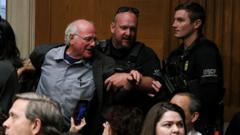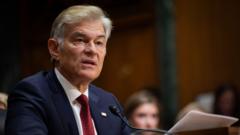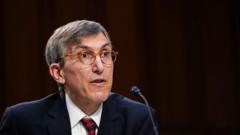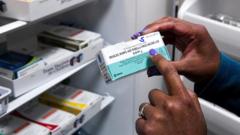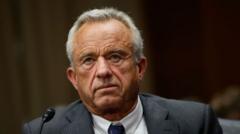Health Secretary Robert F. Kennedy Jr. announces the cancellation of $500 million in funding for mRNA vaccine development, citing safety concerns, which has led to widespread criticism from health experts advocating for the technology.
RFK Jr Halts $500 Million in mRNA Vaccine Funding Amid Controversy

RFK Jr Halts $500 Million in mRNA Vaccine Funding Amid Controversy
The US Department of Health and Human Services cancels funding for mRNA vaccine projects, sparking significant debate over vaccine safety and public health.
In a surprising move, Health Secretary Robert F. Kennedy Jr. has announced the cancellation of $500 million in funding originally allocated for mRNA vaccine development aimed at combating respiratory viruses, including COVID-19 and influenza. This decision, made by the US Department of Health and Human Services (HHS), affects 22 ongoing projects from major pharmaceutical companies like Pfizer and Moderna, which are focusing on vaccines for bird flu and other infectious diseases.
Kennedy, long known for his skepticism regarding vaccines, justified the funding pullback by asserting that "mRNA technology poses more risks than benefits for these respiratory viruses." His statement has sparked backlash from the medical community, with numerous doctors and health professionals criticizing his stance on vaccine safety and efficacy. Many argue that mRNA vaccines played a pivotal role in curbing the COVID-19 pandemic and have saved countless lives.
Peter Lurie, a former official at the US Food and Drug Administration, emphasized that this decision represents a significant retreat from a vital scientific advancement. "The US is turning its back on one of the most promising tools to combat future pandemics," he stated. In response to objections, Kennedy claimed that research suggested these vaccines fail to provide effective protection against respiratory infections.
Kennedy's administration plans to redirect the funding toward alternative vaccine platforms deemed to possess better safety profiles and clearer manufacturing practices. He further conveyed concerns that mRNA vaccines could potentially lead to new viral mutations, a point contested by health experts who assert that viruses mutate regardless of vaccine presence.
Dr. Paul Offit, director of the Vaccine Education Center at Philadelphia's Children's Hospital, called the decision potentially perilous for the nation's pandemic preparedness. He pointed out the rapid development advantages of mRNA vaccines, which were instrumental during the COVID-19 health crisis.
Since assuming office, Kennedy has taken numerous steps to reshape vaccine development approaches in the US, which include the dismissal of a key advisory committee responsible for immunization recommendations—replacing its members with individuals vocal about vaccine safety concerns. He has also withdrawn the COVID-19 vaccine from the CDC's recommended immunization schedule for healthy children and pregnant women.
The implications of Kennedy’s funding cancellation raise concerns about the future of vaccine research in the US, as health officials warn that this could lead to a more vulnerable position in the face of emerging infectious threats.








